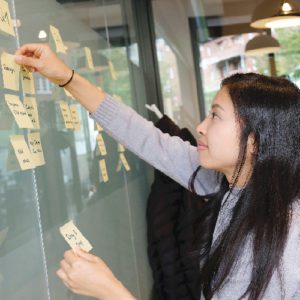Public engagement and education
 Many strategies rely on creating public education programs and on the involvement and support of Easton’s residents to implement. A particularly rich opportunity for climate education exists in Easton’s schools, as young people are increasingly concerned about how action taken on climate change now will affect the course of their lives. For students as well as adult residents of Easton, simply learning about the issue of climate change can be a daunting undertaking, which is why it is so important to make information about how to reduce and prepare for climate change as a community an accessible resource and to create routes for residents to be engaged in projects to support the current and future wellbeing of their community.
Many strategies rely on creating public education programs and on the involvement and support of Easton’s residents to implement. A particularly rich opportunity for climate education exists in Easton’s schools, as young people are increasingly concerned about how action taken on climate change now will affect the course of their lives. For students as well as adult residents of Easton, simply learning about the issue of climate change can be a daunting undertaking, which is why it is so important to make information about how to reduce and prepare for climate change as a community an accessible resource and to create routes for residents to be engaged in projects to support the current and future wellbeing of their community.
- Share information about new and expanded initiatives, public education campaigns and important city actions related to the Climate Action Plan (CAP).
- Assign a new or existing city staff member the role of coordinating outreach efforts regarding CAP programs.
- Create a centralized city CAP and energy website with all plan documents, inventories, monitoring reports, progress metrics, resources, EV charging station locations, links to energy providers, incentive programs and energy efficiency information.
- CAP updates should be part of City Council agenda.
- Partner with trusted community organizations to conduct multilingual outreach, educate about climate related issues and promote incentives/funding opportunities.
- Include in monthly newsletter updates about CAP and use physical mailings in addition to online distribution.
- Partner with schools to develop civic and environmental literacy in K-12 schools.
- Promote leadership opportunities such as those offered by the Alliance for Climate Education.
- Involve local schools in the implementation of the CAP where possible and work with teachers to develop educational material and involve students in volunteer projects.
- Create volunteer opportunities for required community service hours and incentivize student participation.
- Encourage field trips to community gardens, microforest, energy efficient buildings and other CAP efforts for student learning opportunities.
- Continued transparency, progress reports and public engagement related to the Climate Action Plan.
- Hold inclusive discussions regarding climate change policies and programs and engage residents across the city.
- Track progress on the CAP using established metrics and report to the public in clear terms on a regular basis.
- Have an online dashboard with updated CAP information.

